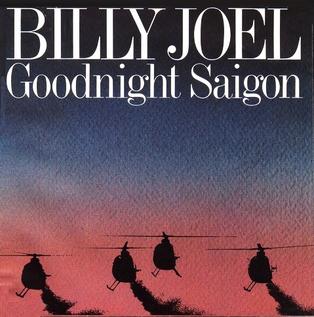Song Stories: Billy Joel: Goodnight Saigon
Billy Joel’s haunting ballad "Goodnight Saigon" stands as one of the most powerful and poignant songs in his extensive catalog. Released in 1982 as part of his The Nylon Curtain album, "Goodnight Saigon" offers a haunting reflection on the Vietnam War, its soldiers, and the deep scars left by a conflict that defined a generation.
Written about the soldiers experiences in Vietnam whilst also confronting and questioning the broader social and political elements that surrounded the war.
With its solemn, march-like beat and vivid lyrics, the song paints a picture of young men sent to fight in a foreign land, far from home and family. Joel’s choice to write from the perspective of a soldier gives the song an authenticity that resonates with listeners, even if they have never been on a battlefield themselves.
The lyrics are powerful in their simplicity and directness. "We met as soulmates on Parris Island, we left as inmates from an asylum," Joel sings, introducing the raw emotion of the soldiers’ experiences. Parris Island, a U.S. Marine Corps training center, is a place where young recruits are molded into soldiers, but the image Joel creates hints at the psychological and emotional toll the experience has already begun to take on them. The contrast between the innocence of joining the military and the brutal realities of war is stark, and it underscores the deep transformation soldiers underwent.

One of the most striking aspects of "Goodnight Saigon" is its portrayal of the soldiers’ sense of brotherhood and solidarity. These soldiers, who formed close-knit relationships in the heat of battle, struggle with the dissonance of surviving while so many others did not. The song suggests that, in the chaos and terror of war, the bonds formed between soldiers are among the few things that keep them grounded.
The final lines of "Goodnight Saigon" are particularly haunting: "And we will all go down together." This is a final tribute to the ultimate sacrifice made by so many soldiers during the Vietnam War soldiers who gave their lives, and others who returned home forever changed.
Despite never serving in Vietnam, Joel felt he needed to raise awareness on the emotional toll the war had, had on those who had served. His father had fought in World War II, and growing up, Joel was aware of the emotional toll that war had on the soldiers who returned home.
Billy Joel sought out the input of actual Vietnam War veterans to make sure the song was as authentic as possible. In interviews, he shared that he wanted to speak with veterans to understand what they went through and to ensure that his portrayal of the experience was as real and respectful as possible.
Joel’s research for "Goodnight Saigon" involved talking to many veterans who shared their stories with him. One particularly important contribution came from a group of veterans who helped shape the lyrics and offered feedback on how to make the song resonate with those who had actually fought in the war. Their voices and experiences were vital in making the song both heartfelt and grounded in the reality of the Vietnam War.
In my opinion it is the best song about the Vietnam War, talking about the reality that was faced by those who were there, as well as talking about the divisions that the war had caused in American society. It does not pull any punches, providing a unflinching look at the trauma of war.
Thank you for reading
Jack